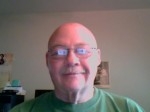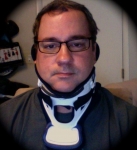Exercise and Apnea
Exercise and Apnea
I found I have mild sleep apnea, UARS, RLS, and PLMD earlier this week. This is quite frustrating to me, because I have lost 50 pounds in the past year, eat healthfully on a consistent basis, and workout at least three times per week. Obviously this didn't do me any good, at least as far as sleep goes. I still need to lose approximately 45 more lbs.
I have been struggling with day time heart palpitations for the past year that seem to be getting more frequent. I went off of Provigil about a year ago, because my resting heart rate was 120 on it. My resting HR was down to 60, and I could comfortably jog a mile by last summer. I have recently been weaned off of two medications (Effexor and Elavil) fairly quickly because they were causing pain, and my new doc says they may have been contributing to the palpitations and fibromyalgia-like pain I've been having. I was on Effexor for migraines and Elavil for sleep (which really confused my new doc, because he says that Elavil negatively affects sleep architecture).
The chiropractor I've been seing (who has experience in bodybuilding, endocrinology, and sleep/fibromyalgia), has suggested that I keep my HR below 150 while exercising until my body is used to not having he Effexor/Elavil and my sleep is settled down. I worked out this morning and became very frustrated. My starting heart rate, without doing anything, was 140, so I had a very small window in which to work. I was only able to ride an exercise bike at 60 rpm and the treadmill I had to stay at 3, else it shot above 150 very quickly. I can't believe how quickly I've declined cardio wise.
During my sleep study, they said my heart rate did go to about 150, but they did not notice the palpitations. My oxygen didn't go below 90%. I'm getting a CPAP in the next few weeks, so hopefully that will help. Any advice on exercise with these disorders would be appreciated.
I have been struggling with day time heart palpitations for the past year that seem to be getting more frequent. I went off of Provigil about a year ago, because my resting heart rate was 120 on it. My resting HR was down to 60, and I could comfortably jog a mile by last summer. I have recently been weaned off of two medications (Effexor and Elavil) fairly quickly because they were causing pain, and my new doc says they may have been contributing to the palpitations and fibromyalgia-like pain I've been having. I was on Effexor for migraines and Elavil for sleep (which really confused my new doc, because he says that Elavil negatively affects sleep architecture).
The chiropractor I've been seing (who has experience in bodybuilding, endocrinology, and sleep/fibromyalgia), has suggested that I keep my HR below 150 while exercising until my body is used to not having he Effexor/Elavil and my sleep is settled down. I worked out this morning and became very frustrated. My starting heart rate, without doing anything, was 140, so I had a very small window in which to work. I was only able to ride an exercise bike at 60 rpm and the treadmill I had to stay at 3, else it shot above 150 very quickly. I can't believe how quickly I've declined cardio wise.
During my sleep study, they said my heart rate did go to about 150, but they did not notice the palpitations. My oxygen didn't go below 90%. I'm getting a CPAP in the next few weeks, so hopefully that will help. Any advice on exercise with these disorders would be appreciated.
- BlackSpinner
- Posts: 9742
- Joined: Sat Apr 25, 2009 5:44 pm
- Location: Edmonton Alberta
- Contact:
Re: Exercise and Apnea
Your best bet is a referral to a physiotherapist once you are successfully using cpap. They can teach you how to exercise properly given your restrictions.
Swimming and exercise in the water can be the gentlest form or beginners.
Swimming and exercise in the water can be the gentlest form or beginners.
_________________
| Machine: PR System One REMStar 60 Series Auto CPAP Machine |
| Additional Comments: Quatro mask for colds & flus S8 elite for back up |
71. The lame can ride on horseback, the one-handed drive cattle. The deaf, fight and be useful. To be blind is better than to be burnt on the pyre. No one gets good from a corpse. The Havamal
Re: Exercise and Apnea
I've been working with a personal trainer, and he's taught me how to stay under the 150 mark while working out.
I'm more frustrated that my cardiorespiratory endurance seems to have declined so rapidly over the past few months, in spite of the fact that there are no obvious heart issues going on.
I've been working out for a year, so I guess I'm still technically a "beginner". But, I was not having any major issues (besides some muscle/joint pain) until the last few months, and was progressing at a steady rate.
I'm more frustrated that my cardiorespiratory endurance seems to have declined so rapidly over the past few months, in spite of the fact that there are no obvious heart issues going on.
I've been working out for a year, so I guess I'm still technically a "beginner". But, I was not having any major issues (besides some muscle/joint pain) until the last few months, and was progressing at a steady rate.
- BlackSpinner
- Posts: 9742
- Joined: Sat Apr 25, 2009 5:44 pm
- Location: Edmonton Alberta
- Contact:
Re: Exercise and Apnea
Perhaps a visit to a pulmonologist is in order. But I would still wait for the cpap therapy to kick in.I'm more frustrated that my cardiorespiratory endurance seems to have declined so rapidly over the past few months, in spite of the fact that there are no obvious heart issues going on.
_________________
| Machine: PR System One REMStar 60 Series Auto CPAP Machine |
| Additional Comments: Quatro mask for colds & flus S8 elite for back up |
71. The lame can ride on horseback, the one-handed drive cattle. The deaf, fight and be useful. To be blind is better than to be burnt on the pyre. No one gets good from a corpse. The Havamal
Re: Exercise and Apnea
Being diagnosed with OSA is a 'heart' issue... it means your oxygen levels dropped during testing and that has to be taken care of, and for you right now a big part of the answer is Cpap... Your trainer may mean well, but is not a doctor and just working out harder and harder is not always the way to go for some people - at least get your problems and results forwarded to one place (doctor) so they'll have the full picture to work with.
Re: Exercise and Apnea
Trainer's trying to help me maintain my cardiovascular endurance and slowly help me increase my strength. I'm working with my neuro/sleep doc (same person in my case) who is also the one who read the sleep study-he did not give me any exercise limitations.
It was actually at the suggestion of my chiropractor to stay under HR of 150 until the dizziness of med withdrawals went away (he has a degree in endocrinology as well as being a chiropractor, and also extensive experience as a strength and conditioning coach). That seemed like reasonable advice, so I'm following it.
My oxygen level only dropped into the low nineties during the night; I'm new to all of this, so I'm not sure how big of a deal that is. Obviously, they prescribed treatment, so they were seeing abnormalities severe enough for a diagnosis. I know that sleep apnea can definitely affect the heart. I meant I don't haven any additional diagnosed heart problems, like some people with apnea do. I do have some arrhythmias while awake, usually when I'm sitting down at night. I mentioned this to the doctor before the study. They reported that there were not any arrhythmias during the two nights at all.
I'm working on getting a machine, but I'm trying to do my research to make sure I get the right equipment, etc., to make treatment as successful as possible.
If the symptoms (dizziness/heart palpitations at rest) continue after a trial with CPAP, I will mention it to my doctor at my follow up appointment.
It was actually at the suggestion of my chiropractor to stay under HR of 150 until the dizziness of med withdrawals went away (he has a degree in endocrinology as well as being a chiropractor, and also extensive experience as a strength and conditioning coach). That seemed like reasonable advice, so I'm following it.
My oxygen level only dropped into the low nineties during the night; I'm new to all of this, so I'm not sure how big of a deal that is. Obviously, they prescribed treatment, so they were seeing abnormalities severe enough for a diagnosis. I know that sleep apnea can definitely affect the heart. I meant I don't haven any additional diagnosed heart problems, like some people with apnea do. I do have some arrhythmias while awake, usually when I'm sitting down at night. I mentioned this to the doctor before the study. They reported that there were not any arrhythmias during the two nights at all.
I'm working on getting a machine, but I'm trying to do my research to make sure I get the right equipment, etc., to make treatment as successful as possible.
If the symptoms (dizziness/heart palpitations at rest) continue after a trial with CPAP, I will mention it to my doctor at my follow up appointment.
Re: Exercise and Apnea
Well, atrial fibrillation is definitely something that can happen as a result of OSA and can often be alleviated by getting the OSA treated... you can look at the Cpap.Wiki here (click on the lightbulb) for more information or talk to your doctor.
Re: Exercise and Apnea
Yes, I read about the atrial fibrillation. Pretty scary stuff; I'm only 28 and definitely don't want to start down the road to heart issues. I was just diagnosed on Tuesday, so I'm still trying to learn everything I can.
Re: Exercise and Apnea
andHea83ther wrote: I'm working on getting a machine, but I'm trying to do my research to make sure I get the right equipment, etc., to make treatment as successful as possible.
Since your are just starting out on the OSA/CPAP adventure, I thought I'd bring these things up even though it doesn't deal with your initial post on this thread.I was just diagnosed on Tuesday, so I'm still trying to learn everything I can.
Doing the research to get the right equipment is critical. Here are some links that will help you in your research.
First, read JanKnitz's excellent What You Need to Know Before You Meet Your DME.
Next JanKnitz also has an excellent guide to Data Capable Machines
For more general advice on the kinds of things you need to be thinking about with a new OSA diagnosis, you might find my Advice for Those Newly Diagnosed with OSA useful.
Finally you might find my Understanding the Data in Your Sleep Test Reportuseful if all those numbers in your sleep test report are making your head spin.
_________________
| Machine: DreamStation BiPAP® Auto Machine |
| Mask: Swift™ FX Nasal Pillow CPAP Mask with Headgear |
| Additional Comments: PR System DreamStation and Humidifier. Max IPAP = 9, Min EPAP=4, Rise time setting = 3, minPS = 3, maxPS=5 |
- NightMonkey
- Posts: 801
- Joined: Sat Jan 15, 2011 2:43 pm
- Location: Three seats, orchestra right
Re: Exercise and Apnea
Hea83ther wrote: I'm getting a CPAP in the next few weeks, so hopefully that will help.
That is a good precaution at the present time. Depending on the severity of your apnea your heart is already under moderate to great stress while you are sleeping. Extra stress caused by working out might do some serious damage.
There are two things you should do while waiting to get your CPAP going. First, keep your workouts short and easy to keep down the additional stress on your heart and the rest of your body. Second, entirely avoid backsleeping - sleep on sides or stomach. This may reduce the frequency and length of the breathing events you are experiencing.
You should get a machine with software so that you can keep a good check on the effectiveness of your treatment. Without data you are making a subjective guess of whether the treatment is working well. Your guess could be badly wrong.
After you start CPAP and the data shows the treatment is effective, you can start gradually stepping up the intensity of the workouts depending on any symptoms you have.
I am in very good shape and younger than you. After much reading and some discussions with my sleep doctor, when I have a bad night with my CPAP I will skip the next day's workout or make it a short light one. If you are already exhausted when you start your workout you will only tear down not build up.
NightMonkey
Blow my oropharynx!
the hairy, hairy gent who ran amok in Kent
Blow my oropharynx!
the hairy, hairy gent who ran amok in Kent
Re: Exercise and Apnea
Thanks for the advice. I definitely will keep the intensity low until I get started on therapy. I have RLS, PLMD, fibromyalgia, UARS, and a seizure disorder (which is under control with meds) in addition to apnea. I'm so out of shape at this point (even after working out for a year) that the most intense cardio I'm able to do is walk at 3.5 on the treadmill (if I want to keep my HR under 150). I was able to slowly jog a mile this summer, but had to stop jogging due to pain. My HR/endurance vary greatly from day-to-day and even time of day makes a difference (it's worse in the morning). My strength is pretty low too; I cannot lift more than a ten pound dumbbell very easily, and that's on a good day. However, I abused my body for years due to poor eating habits and lack of exercise, so I know that it will take longer than a year to undo.
They said at the sleep study my apnea is mild, and it was easy to control during the titration at a low pressure. The EKG part of the study showed no abnormalities during the study, which is good. They were more concerned about the negative effect it was having on my sleep architecture (lack of stage 3 and 4, disrupted/shortened REM cycles) and preventing the development of future consequences (heart attack and stroke). I do have palpitations during the day. I'm unsure at to whether this is casued by the fibromyalgia or one of the breathing issues.
A friend has offered to give me a machine for free. It is the sleepstyle 600; unfortunately, it does not have data capabilities to my knowledge. I've been told by others on this board that the machine is very good other than that. I have a high deductible insurance plan, and cannot afford to pay $600 out-of-pocket for the startup. In addition to the cpap, I've had multiple tests, dr's. appointments, and the two nights of sleep studies.
I will most likely try my friend's machine first, and then if I am not noticing a decrease in symptoms by my followup appointment in a few months, I will talk to my doctor about whether I need to get a different machine.
Any excercise tips you have would be appreciated, especially for someone who has made it work with apnea.
They said at the sleep study my apnea is mild, and it was easy to control during the titration at a low pressure. The EKG part of the study showed no abnormalities during the study, which is good. They were more concerned about the negative effect it was having on my sleep architecture (lack of stage 3 and 4, disrupted/shortened REM cycles) and preventing the development of future consequences (heart attack and stroke). I do have palpitations during the day. I'm unsure at to whether this is casued by the fibromyalgia or one of the breathing issues.
A friend has offered to give me a machine for free. It is the sleepstyle 600; unfortunately, it does not have data capabilities to my knowledge. I've been told by others on this board that the machine is very good other than that. I have a high deductible insurance plan, and cannot afford to pay $600 out-of-pocket for the startup. In addition to the cpap, I've had multiple tests, dr's. appointments, and the two nights of sleep studies.
I will most likely try my friend's machine first, and then if I am not noticing a decrease in symptoms by my followup appointment in a few months, I will talk to my doctor about whether I need to get a different machine.
Any excercise tips you have would be appreciated, especially for someone who has made it work with apnea.
Re: Exercise and Apnea
This has way more to do with how your throat is built than weight, exercise, or anything else. I've lost 100 lbs and am still on the hose...and always will be. Been on it going on 13 years now.
Good luck
JeffH
Good luck
JeffH
- Kairosgrammy
- Posts: 529
- Joined: Mon Jan 02, 2012 8:13 am
Re: Exercise and Apnea
I'm not sure I know the answer to your question except to say, keep exercising. Cpap may help all of that. Have you received any medication for rls or the other problems? Even if you can't do as much as you'd like, do something is better than nothing.Hea83ther wrote:I found I have mild sleep apnea, UARS, RLS, and PLMD earlier this week. This is quite frustrating to me, because I have lost 50 pounds in the past year, eat healthfully on a consistent basis, and workout at least three times per week. Obviously this didn't do me any good, at least as far as sleep goes. I still need to lose approximately 45 more lbs.
I have been struggling with day time heart palpitations for the past year that seem to be getting more frequent. I went off of Provigil about a year ago, because my resting heart rate was 120 on it. My resting HR was down to 60, and I could comfortably jog a mile by last summer. I have recently been weaned off of two medications (Effexor and Elavil) fairly quickly because they were causing pain, and my new doc says they may have been contributing to the palpitations and fibromyalgia-like pain I've been having. I was on Effexor for migraines and Elavil for sleep (which really confused my new doc, because he says that Elavil negatively affects sleep architecture).
The chiropractor I've been seing (who has experience in bodybuilding, endocrinology, and sleep/fibromyalgia), has suggested that I keep my HR below 150 while exercising until my body is used to not having he Effexor/Elavil and my sleep is settled down. I worked out this morning and became very frustrated. My starting heart rate, without doing anything, was 140, so I had a very small window in which to work. I was only able to ride an exercise bike at 60 rpm and the treadmill I had to stay at 3, else it shot above 150 very quickly. I can't believe how quickly I've declined cardio wise.
During my sleep study, they said my heart rate did go to about 150, but they did not notice the palpitations. My oxygen didn't go below 90%. I'm getting a CPAP in the next few weeks, so hopefully that will help. Any advice on exercise with these disorders would be appreciated.
_________________
| Mask: Swift™ FX For Her Nasal Pillow CPAP Mask with Headgear |
| Additional Comments: I'm starting to use sleepyhead. |
Re: Exercise and Apnea
I'm on .25 mg of Requip. They said the PLMD on its own wasn't severely disrupting my sleep, but in conjunction with everything else. It was making the situation work. I will definitely keep trying to exercise-cautiously.
- retrodave15
- Posts: 402
- Joined: Sun Nov 13, 2011 1:56 pm
- Location: Newark, OH
Re: Exercise and Apnea
I tried Requip it did not work for me, but that was just me. You mentioned that you also have fibro as well. Ever tried Gabapentin? Some docs view Gabapentin as the "swiss army knife" as they give it for fibro pain, rls, and a whole other list of "off label" uses. I switched from Requip to Gabapentin, 800mg a day for my RLS. It seems to work pretty good and it is cheaper than the Requip.Hea83ther wrote:I'm on .25 mg of Requip. They said the PLMD on its own wasn't severely disrupting my sleep, but in conjunction with everything else. It was making the situation work. I will definitely keep trying to exercise-cautiously.
_________________
| Mask: Swift™ FX Nasal Pillow CPAP Mask with Headgear |
| Additional Comments: Sleepy Head for Mac, Miami J C- Collar for post C-Spine Surgery recovery |
Dave
Event Planner / Trade show Manager / Driver of the Winnebago
Newark, Ohio
Wife's Equipment: PRS1 AutoIQ w/ Cflex+, Swift FX for Her
Event Planner / Trade show Manager / Driver of the Winnebago
Newark, Ohio
Wife's Equipment: PRS1 AutoIQ w/ Cflex+, Swift FX for Her















